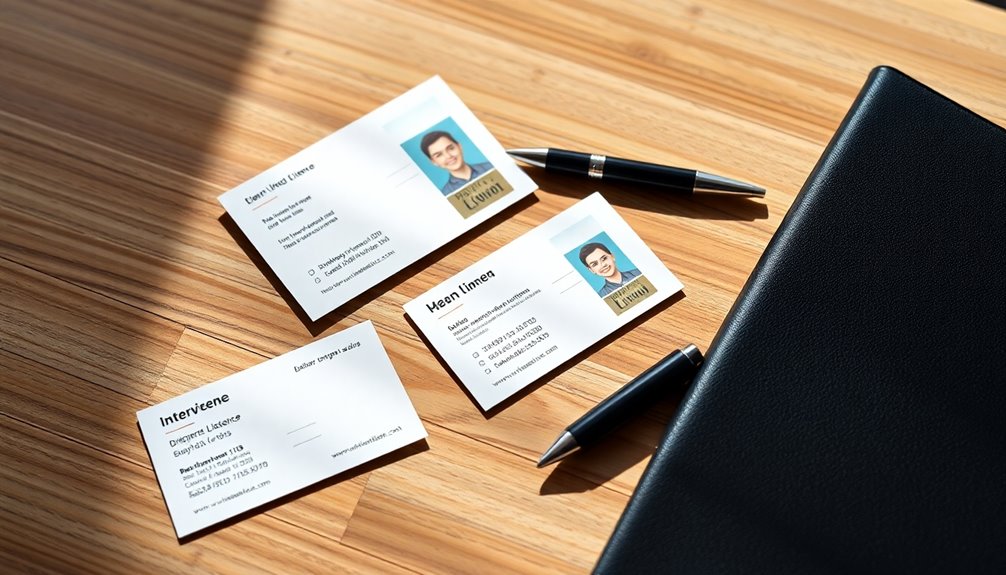AI interviews are reshaping how hiring works, and you've got to keep up. First, be authentic—share your unique story instead of generic content. Remember, AI tools need human oversight to evaluate creativity and emotional intelligence. Use AI to optimize your resume while showcasing your personal narrative. During the interview, maintain eye contact and practice good posture to convey confidence. Answer with enthusiasm and incorporate keywords from the job description to align with AI metrics. By mastering these tactics, you'll stand out to both machines and humans alike. Reveal even more strategies to excel in AI-driven environments!
Key Takeaways
- Highlight your unique personal narrative to stand out against AI-generated responses and resonate with hiring managers.
- Maintain strong eye contact to enhance engagement and simulate face-to-face interaction during virtual interviews.
- Tailor your responses using job description keywords to improve visibility in AI screening processes.
- Showcase your adaptability by discussing gaps in employment and shifts in your career, demonstrating resilience.
- Prepare for common AI prompts by practicing clear, concise responses that reflect genuine enthusiasm and curiosity.
The Importance of Authenticity

While AI-generated resumes might save you time, they often lack the authenticity that truly sets you apart in a competitive job market. One thing hiring managers crave is a genuine glimpse into your career journey. When you present overly polished and generic content, you miss the chance to showcase the unique challenges and growth experiences that define your professional life.
Authenticity in your resume allows hiring managers to see the real you—the resilience, character, and lessons learned along the way. These personal narratives provide valuable insights that AI-generated resumes simply can't replicate. By emphasizing your unique experiences, you differentiate yourself from candidates who rely solely on automated content.
In the hiring process, it's not just about achievements and accolades; it's about how you've navigated obstacles and what you've learned from them. Employers want to connect with individuals who understand their own journeys and can articulate them effectively. So, take the time to craft a resume that reflects your true self. It'll not only help you stand out but also lead to better-fit opportunities that align with your authentic story.
Human Oversight in Hiring

In today's fast-paced hiring landscape, a significant number of employers rely heavily on AI tools for screening candidates. While these technologies can streamline processes, they often filter out qualified individuals based on superficial criteria. This approach risks overlooking candidates with valuable skills and experiences that don't fit neatly into algorithmic boxes.
One-way video interviews and CV scanners frequently miss essential human attributes like creativity and emotional intelligence, which are critical for many roles. When you lean solely on AI, you may narrow your focus, failing to recognize the diverse backgrounds and unique career paths that enrich team dynamics.
Incorporating human oversight in hiring is fundamental. It allows you to conduct deeper evaluations, uncovering hidden talents and qualities that automated systems may overlook. By balancing technology with human judgment, you foster a more inclusive and effective hiring process. This not only improves your decision-making but also leads to greater organizational success. Remember, the best hires often come from a blend of technological efficiency and human insight. Embrace the strengths of both to guarantee you're making the most informed choices for your team.
Leveraging AI Tools Wisely

Harnessing AI tools effectively can elevate your job application and stand out in a competitive market. By integrating these technologies into your resume and application process, you showcase your tech-savvy skills while maintaining a personal touch. Here are four ways to leverage AI tools wisely:
- Optimize Your Resume: Use AI to enhance clarity and organization, ensuring that your qualifications shine through without feeling robotic.
- Demonstrate Strategic Thinking: If your role involves data management, show how you've integrated AI into your workflows to solve problems or streamline processes.
- Tell Your Story: While AI can polish your resume, don't let it replace your authentic narrative. Share real-life experiences that highlight your unique journey and skills.
- Assess Your Integration: Reflect on how deeply you've woven AI into your professional practices. This can signal your adaptability and understanding of modern tools to potential employers. Moreover, your ability to utilize AI-driven solutions can enhance your threat detection capabilities in various professional settings, showcasing your proactive approach to security.
Cultivating Curiosity in Interviews

Curiosity can transform interviews from a mere exchange of qualifications into a dynamic conversation that reveals a candidate's true potential. By fostering a culture of curiosity, you can dig deeper than surface-level experiences, uncovering resilience and adaptability in challenging situations. This approach not only enhances engagement but also helps identify hidden talents that automated systems might miss. Additionally, cultivating cultural intelligence is crucial for effectively navigating diverse interview scenarios, enabling you to connect with candidates from various backgrounds.
Here's a quick overview of how curiosity can reshape your interview process:
| Curiosity-Driven Questions | Insights Uncovered | Benefits |
|---|---|---|
| Gaps in employment | Character and ability to navigate change | Understanding candidate's journey |
| Shifts in industry | Adaptability and willingness to learn | Revealing versatility |
| Past decisions and thought processes | Strategic thinking and problem-solving skills | Evaluating decision-making capabilities |
| Nuanced experiences | Authenticity and unique contributions | Gaining a richer perspective |
Mastering Non-Verbal Communication

When you're in a virtual interview, mastering non-verbal communication is essential for making a strong impression. Eye contact with the camera and a polished presence can enhance your confidence and engagement. Remember, audiences often judge your credibility based on visual cues, so being mindful of your body language matters. Additionally, establishing healthy boundaries during the interview can help you maintain professionalism and ensure a respectful interaction.
Importance of Eye Contact
How can you elevate your virtual interview presence? One powerful tool at your disposal is eye contact. Maintaining eye contact during a virtual interview not only enhances your engagement but also makes you appear more confident and credible. Here's why it matters:
- Establish Trust: Eye contact conveys sincerity, helping you build a stronger connection with your interviewers, which is essential in today's competitive job market.
- Increase Perceived Competence: Research indicates that candidates who maintain appropriate eye contact are often viewed as more trustworthy and competent, influencing hiring decisions in your favor.
- Minimize Distractions: Effective eye contact reduces potential distractions, allowing both you and the interviewer to focus on the conversation and create a more productive experience.
- Enhance Communication: Practicing eye contact can greatly improve your overall communication effectiveness, helping you convey your messages more clearly and engage more deeply with your interviewers.
- Emotional intelligence plays a crucial role in how well you connect with interviewers, making eye contact even more significant in establishing rapport and understanding.
Effective Camera Presence
Mastering your camera presence is just as important as maintaining eye contact during virtual interviews. When you look directly into the camera, it simulates face-to-face interaction, enhancing your communication effectiveness and engaging your audience. This eye contact not only helps you connect but also boosts your perceived confidence and credibility, leaving a positive impression on interviewers.
To further improve your camera presence, practice natural speech patterns. This reduces your reliance on notes, which can detract from your engagement and lead to negative judgments from viewers. Remember, non-verbal signals like body language and facial expressions play a vital role in how audiences perceive your authenticity. Be mindful of your posture and facial expressions; they can greatly impact how you're received.
Additionally, make sure your background is well-lit and professional. A polished appearance increases visibility and reinforces your professionalism, making you more memorable to potential employers. By focusing on these elements, you can master your camera presence and stand out in AI-driven interviews, creating a lasting impression that sets you apart from other candidates. Moreover, being aware of your data privacy can help you feel more secure during online interactions, allowing you to focus on delivering your best performance.
Understanding Screen Judging
Three key aspects of non-verbal communication greatly affect your performance during virtual interviews: body language, facial expressions, and eye contact. These elements convey your confidence and engagement, which AI systems and human evaluators alike scrutinize closely.
To enhance your non-verbal communication, focus on the following:
- Body Language: Maintain an open posture. Avoid crossing your arms, as it can signal defensiveness.
- Facial Expressions: Smile genuinely and use appropriate expressions to reflect your enthusiasm. This fosters a connection with the interviewer.
- Eye Contact: Look directly at the camera, simulating eye contact with the interviewer. This shows confidence and keeps them engaged.
- Authenticity: Be yourself! Authentic non-verbal signals help establish trust, making you more relatable and memorable.
Additionally, being aware of astrological influences can boost your self-image and confidence during interviews. Avoid reading from notes; it risks appearing unprepared and disconnected. Instead, practice delivering your key points naturally. By honing these non-verbal skills, you'll not only improve your presence but also make a lasting impression during AI interviews.
Understanding AI Evaluation Metrics

When preparing for an AI interview, understanding scoring metrics is key to your success. Eye contact plays a vital role in how AI tools evaluate your engagement, so you'll want to maintain it throughout the conversation. By grasping these evaluation criteria, you can better tailor your approach and potentially boost your scores.
Eye Contact Importance
Establishing strong eye contact during AI interviews can make a significant difference in how you're perceived. It not only enhances engagement levels but also positively influences the scoring metrics used to evaluate candidates. Here are four reasons why eye contact is essential:
- Authenticity: Maintaining eye contact simulates face-to-face interaction, conveying your genuine confidence and interest in the conversation.
- Professionalism: Non-verbal cues, like eye contact, are closely monitored by AI systems, impacting your overall perception as a professional and attentive candidate.
- Focus: Consistent eye contact reduces distractions, helping keep both you and the AI system focused on the interaction. This focus is important for achieving favorable evaluations.
- Mitigation of Negative Judgments: Practicing natural eye contact can help counteract any negative impressions that may arise from excessive reading of notes, thereby improving your score in AI assessments.
Scoring Metrics Overview
Understanding AI evaluation metrics is essential for anyone preparing for virtual interviews. These metrics focus heavily on engagement levels, with eye contact and clarity being fundamental in determining your score. As you present yourself, remember that AI systems analyze non-verbal cues like body language and facial expressions. These elements can greatly impact how AI perceives you as a candidate.
Consistency in your delivery is vital. AI evaluates how well you maintain composure and communicate your message throughout the interview. If you rely too much on notes, it might signal a lack of preparation or confidence, which can detract from your overall score.
While scoring metrics can vary across different AI platforms, common factors include engagement, clarity, confidence, and the ability to make authentic connections with your audience. To excel, focus on demonstrating genuine interest and enthusiasm in your responses. Practice maintaining eye contact and employing positive body language to enhance your non-verbal communication. By understanding these scoring metrics, you can position yourself to outsmart the bots and increase your chances of success in virtual interviews.
Best Practices for Virtual Interviews

How can you make a lasting impression during a virtual interview? To stand out, focus on these best practices:
- Eye Contact: Maintain direct eye contact with the camera. This enhances engagement and conveys confidence, making you appear more authentic and connected to the interviewer.
- Natural Speaking: Practice speaking naturally to minimize reliance on notes. A fluid conversation showcases your communication skills and reduces any negative judgments based on visual cues.
- Professional Setting: Verify your background is well-lit and clear. A professional environment minimizes distractions, keeping the focus on your responses.
- Tech Check: Test your technology in advance. Check audio and video equipment to prevent disruptions, demonstrating your preparedness and adaptability.
Engaging With AI Systems Effectively

In today's job market, engaging effectively with AI systems during interviews can greatly boost your chances of success. Start by understanding the algorithms behind these systems. Tailor your responses to align with the criteria they're evaluating. This alignment increases your chances of standing out. Make sure to utilize keywords from the job description in your answers. Many AI systems rely on keyword matching, so this can enhance your visibility during screenings.
Practice your responses to common AI interview prompts. Clear and concise answers are essential for AI evaluation metrics, so rehearse until you're comfortable. Remember that AI systems also assess tone and inflection, so maintain an enthusiastic and confident vocal delivery during virtual interviews. This can make a significant difference in how your responses are perceived.
Lastly, don't forget to showcase your unique experiences and stories. Aim for authenticity in your answers, as this helps you resonate beyond algorithmic filters. By focusing on what makes you distinct, you'll stand out against AI-generated content. Engage thoughtfully with the AI system, and you'll improve your chances of landing that desired position. Additionally, understanding that AI integration in smartphones has revolutionized user experiences can provide insights into how technology influences communication styles.
Frequently Asked Questions
How to Trick AI Resume Screening?
To trick AI resume screening, you've gotta tailor your resume to match the job description closely. Use specific keywords that align with the role to increase your chances of passing the automated checks. Highlight your quantifiable achievements and unique experiences, keeping the format clean and organized. Avoid jargon; clear language improves AI readability. Make sure to showcase relevant skills and certifications prominently, as these elements often catch the AI's attention first.
How to Pass an AI Interview?
To pass an AI interview, it's all about clarity and relevance. You'll want to use straightforward language and incorporate keywords from the job description. Don't forget to maintain eye contact with the camera to show engagement. Prepare for behavioral questions by highlighting your unique experiences. Finally, set up a professional environment and practice your delivery; a polished presentation can really make you stand out. So, get ready to shine!
How to Beat AI Recruitment Tools?
To beat AI recruitment tools, start by customizing your resume with unique experiences and achievements that reflect your individuality. Use keywords from the job description to align your qualifications with the AI's scanning criteria. During interviews, engage in curiosity-driven discussions about your challenges and decisions to showcase your depth. Also, practice your communication skills, like maintaining eye contact and camera presence, to convey authenticity and confidence that AI can't easily assess.
How to Avoid AI Resume Screening?
You might think your resume's perfect, but what if it's not getting past AI screenings? To avoid being filtered out, tailor your resume with specific keywords from the job description. Highlight your unique experiences and achievements—generic statements just won't cut it. Keep formatting simple; complex layouts can confuse AI. Finally, use clear headings and include quantifiable metrics. This way, you'll stand out, not just to machines, but to real people too.
Conclusion
As you navigate the evolving landscape of AI interviews, remember the wisdom of Shakespeare: "All the world's a stage." Embrace your authenticity, cultivate curiosity, and master non-verbal cues to shine in this new arena. While AI tools can offer insights, your unique human qualities will always set you apart. By understanding AI evaluation metrics and engaging effectively, you'll not only outsmart the bots but also showcase your true self, ready to seize the opportunities that await.
Felicity, our Author, pens in-depth articles and guides that delve into the heart of personal discovery. Her narrative-driven approach weaves together theory, practice, and personal anecdotes, making the journey of self-exploration both relatable and inspiring. Felicity’s contributions help illuminate the path for those seeking a deeper understanding of themselves and their relationships.










